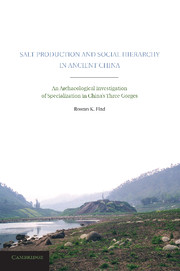 Salt Production and Social Hierarchy in Ancient China
Salt Production and Social Hierarchy in Ancient China Published online by Cambridge University Press: 07 September 2011
How, when, and where did complex societies first emerge in China? This question has been at the heart of archaeological research since the discipline began to develop in China in the 1920s. Scholars in the West have shown particular interest in the process by which centralized states and expansive empires emerged in the Late Neolithic and Bronze Age in the Yellow River valley (e.g., Chang 1983b, 1986; Creel 1970; Fried 1983; Liu 2004; Liu and Chen 2003; Underhill and Fang 2004; von Falkenhausen 2006b), which is traditionally considered the core of Chinese civilization, as well as in adjacent regions (e.g., Li 2006; Nelson 1996; Shelach 1999, 2009). The Sichuan Basin and surrounding areas, where recent discoveries have established that complex polities emerged contemporaneously with the development of social complexity in the Central Plains (Bagley), have only become a focus of interest more recently (Flad and Chen n.d.).
To examine emergent complexity in China, as elsewhere, a key factor that must be explored is the degree to which social roles of community members are interdependent and involve stratified relations of authority. The development of economic specialization plays an important role in the establishment of both interdependence and stratification. This study examines the emergence and organization of specialized salt production at the eastern Sichuan Basin site of Zhongba and explores the implications that this specialization has for emergent complexity in the region.
To save this book to your Kindle, first ensure no-reply@cambridge.org is added to your Approved Personal Document E-mail List under your Personal Document Settings on the Manage Your Content and Devices page of your Amazon account. Then enter the ‘name’ part of your Kindle email address below. Find out more about saving to your Kindle.
Note you can select to save to either the @free.kindle.com or @kindle.com variations. ‘@free.kindle.com’ emails are free but can only be saved to your device when it is connected to wi-fi. ‘@kindle.com’ emails can be delivered even when you are not connected to wi-fi, but note that service fees apply.
Find out more about the Kindle Personal Document Service.
To save content items to your account, please confirm that you agree to abide by our usage policies. If this is the first time you use this feature, you will be asked to authorise Cambridge Core to connect with your account. Find out more about saving content to Dropbox.
To save content items to your account, please confirm that you agree to abide by our usage policies. If this is the first time you use this feature, you will be asked to authorise Cambridge Core to connect with your account. Find out more about saving content to Google Drive.